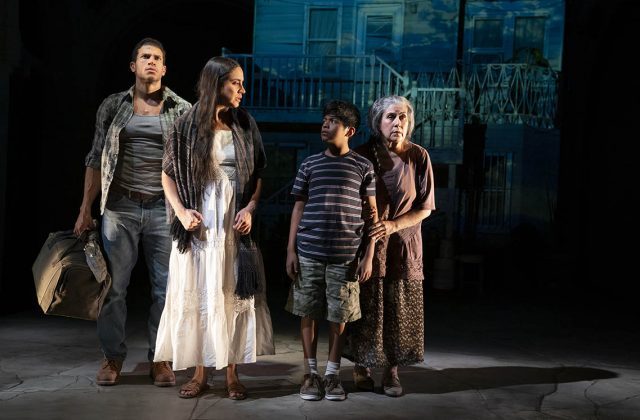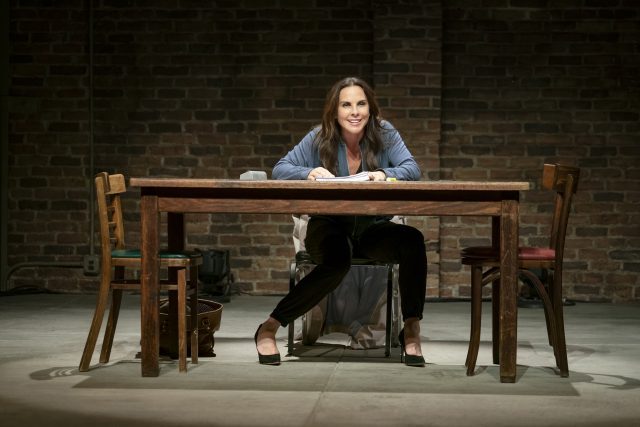
An undocumented Mexican family faces problems in Queens in Mojada (photo by Joan Marcus)
MOJADA
The Public Theater, LuEsther Hall
425 Lafayette St. by Astor Pl.
Tuesday – Sunday through August 18, $60
212-967-7555
www.publictheater.org
A pair of hard-hitting plays by queer Latinx writers involving crises at the US-Mexico border are currently running in the Village through August 18; Luis Alfaro’s Mojada, a modern-day take on Euripides’s Medea, is at the Public’s LuEsther Hall, while the Audible-produced the way she spoke, by Alfaro’s friend and protégé, Isaac Gomez, is at the Minetta Lane. In Mojada, which translates as “wetback,” Alfaro, who was born in 1963 in Los Angeles, follows a Mexican family as it makes the harrowing journey over the border and into America, finally settling in Queens. Medea (Sabina Zúñiga Varela) works tirelessly as a seamstress, scared to leave the house for fear of being caught as an undocumented immigrant, while Jason (Alex Hernandez) has gotten a promising construction job with a boss, Tita (Socorro Santiago), who has big plans for him. Medea and Jason have a young son, Acan (Benjamin Luis McCracken), and an opinionated housekeeper, Pilar (Ada Maris), who introduces Medea to Luisa (Vanessa Aspillaga), a vibrant, upbeat street vendor. Medea is haunted by the horrible things the family experienced during its escape from Mexico, which are shown in flashbacks. As Jason starts leaving his heritage behind, eager to be more American in order to succeed in business, Medea retreats into a shell, her only release a ritual that calms her.
Mojada takes place in the backyard of a ramshackle home, designed by Arnulfo Maldonado. Director Chay Yew, who previously collaborated with Alfaro on Oedipus El Rey at the Public, seamlessly flows the action between past and present, with the assistance of moody lighting by David Weiner and atmospheric sound design by Mikhail Fiksel. There’s a sharp reality to the story that is halted whenever Medea performs her healing rituals, which involve two large, green guaco leaves. Aspillaga nearly steals the show as the fast-talking, unfiltered Luisa, who asks Medea to alter a dress for her so she can titillate her husband, and Maris adds dark humor as the suspicious Pilar, who doesn’t trust Jason or Tita. MacArthur Genius Award recipient Alfaro (Delano, St. Jude) avoids preaching as he delves into the many obstacles illegal immigrants face as they struggle to make a safe life for themselves in America.

Kate del Castillo plays an actress reading an emotional script in the way she spoke (photo by Joan Marcus)
the way she spoke
Minetta Lane Theatre
18 Minetta Lane between Sixth Ave. and Macdougal St.
Tuesday – Sunday through August 18, $50
thewayshespokeplay.com
www.minettalanenyc.com
In Gomez’s tense one-woman show the way she spoke: a docu-mythologia, telenovela star Kate del Castillo (La reina del Sur) plays an actress who comes to an empty warehouse to read a new script by a friend of hers, a playwright and former roommate named Isaac Gomez who relishes her opinion. “You’re the only writer I know who actually wants to know what I think,” she says. The pages are waiting for her on a table with a few chairs; as she reads them, she circles words, makes notes, and looks out into the audience, where the unseen playwright watches her. The play is a graphic depiction of ongoing, decades-long femicide that is occurring in Ciudad Juárez in Mexico, just across the border from El Paso, Texas, where Gomez was born and raised. The play follows Gomez as he speaks with various men and women in Juárez to try to understand what is happening, and why so little is being done about it. “I never knew the truth about these women,” del Castillo says as Gomez. “And that embarrassed me. Everybody knew about it but me. And the more I read. The more I researched. The more I became obsessed. I needed to go back to Juárez and see if for myself.”
Del Castillo portrays all the characters: mothers of los desaparecidos (“the disappeared”), menacing men in a bar, a thirtysomething woman who talks about the constant level of fear that pervades the area, a fiftysomething father and activist, an ex-con who blames the police, a newspaper editor who can’t believe that some people want to bury the story, and la virgen, who explains how difficult it is to hear an endless stream of prayers from distraught mothers. “I can’t get to all of them. It’s impossible; there’s too many. And it kills me. It kills me,” she says. Obie-winning director Jo Bonney (Mlima’s Tale, Fucking A) keeps del Castillo active on Riccardo Hernandez’s sparse set; she occasionally gets up to take in the devastating things she is reading. At the center of it all are the women and children who were so brutally murdered, mutilated, and raped; Gomez names several dozen of them and details their deaths in a heartbreaking section that will make you both sad and angry. Gomez, at twenty-eight about half the age of his mentor, Alfaro, displays a sensitivity beyond his years. His other works include The Displaced and La Ruta, which also reveal his commitment to social justice and telling hard truths. Gomez and Alfaro are two playwrights to watch as they continue to bring unique, distressing, but necessary stories to light in their poignant dramas.